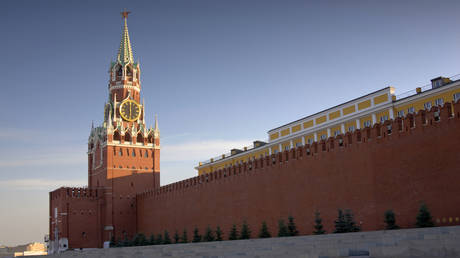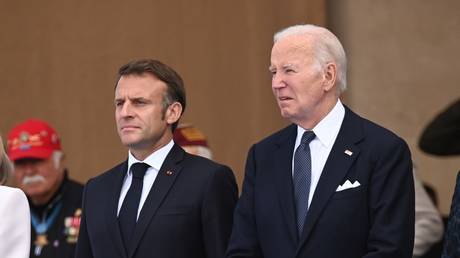ARTICLE AD BOX
The French president has claimed that several allies have already agreed to deploy military trainers in the former Soviet republic
French President Emmanuel Macron has gone beyond merely talking about the possibility of deploying NATO troops in Ukraine, taking steps to form a coalition of military trainers who would work inside the former Soviet republic preparing Kiev’s soldiers to fight Russian forces.
“We want to have a coalition for reasons of efficiency, and several of our partners have already given their agreement,” Macron told reporters on Friday in Paris. “We will use the coming days to finalize the largest possible coalition capable of responding to Ukraine’s request.”
Macron didn’t identify the countries, other than France, that have committed to send trainers to Ukraine. He argued that dispatching specialists to do training work inside Ukrainian shouldn’t provoke a Russian response.
“We are not at war with Russia,” Macron said. “We do not want an escalation, but we want to do everything in our power to help Ukraine resist. Is it an escalation if Ukraine asks us to train mobilized soldiers on its soil? No, that does not mean deploying people – European or allied soldiers – on the front line.”
Read more Western troops in Ukraine ‘have no immunity’ – Kremlin
Western troops in Ukraine ‘have no immunity’ – Kremlin
Macron made his comments after hosting a visit by Ukraine’s Vladimir Zelensky. He announced on Thursday that France will send Mirage 2000 fighter jets to Kiev and train Ukrainian pilots. It will reportedly take until around the end of this year to have pilots ready to fly the warplanes.
French forces have already trained around 10,000 Ukrainian troops in France and other NATO countries. Lithuania and Estonia have also publicly suggested that they would be willing to deploy instructors inside Ukraine. In fact, Estonian Prime Minister Kaja Kallas said last month that NATO trainers were already operating in the battle-torn state.
Read more Biden overruled Macron on Ukraine troop deployment – Politico
Biden overruled Macron on Ukraine troop deployment – Politico
Russian officials have repeatedly warned that any foreign military personnel in Ukraine would be considered legitimate targets for attack, regardless of their duties and locations. The Russian Foreign Ministry said Macron’s “belligerent rhetoric” and provocative statements had escalated the Ukraine crisis.
Macron began making public comments about the possibility of troop deployments to Ukraine in February, triggering pushback from some NATO allies and a Kremlin warning that such a step would inevitably lead to a direct conflict with Russia. US President Joe Biden reportedly rejected Macron’s proposal to send instructors to Kiev, citing concern that those troops could be in the line of fire and spark an escalation.
.png)
 5 months ago
5
5 months ago
5








 English (US)
English (US)